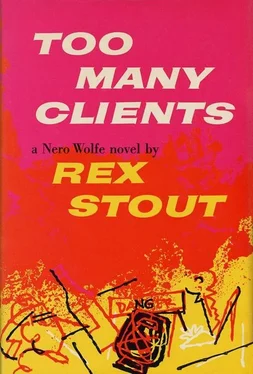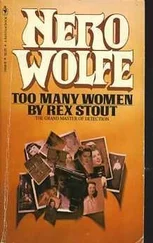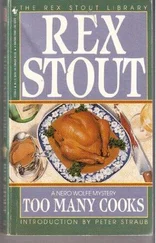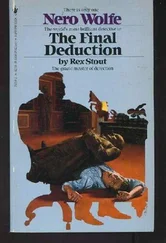I shook my head. “Sorry I can’t oblige. Have you read my report?”
“Yes. Manifestly he is a man with a special and educated fondness for words. He said, ‘Else there was no use coming.’ He said, ‘I can speak in assured confidence?’ He said, ‘That will suffice.’ The last two are merely noticeable, but the first is extraordinary. ‘Else’ instead of ‘or’ or ‘otherwise’? Remarkable.”
“If you say so.”
“I do. But also, merely talking along, he quoted from John Webster’s The Duchess of Malfi: ‘Other sins only speak; murder shrieks out.’ He quoted from John Harington’s Alcilia: ‘Treason doth never prosper.’ He quoted from Browning’s Paracelsus: ‘Measure your mind’s height by the shade it casts.’ People quote to display their erudition, but why to you? You heard him and were looking at him. Was he trying to impress you?”
“No. He was talking, that was all.”
“Just so. And he had sentences at the tip of his tongue from two Elizabethans and Robert Browning. Not one man in ten thousand is familiar with both Webster and Browning. He’s a pedagogue. He’s a teacher of literature.”
“You’re not.”
“I recognized only Webster. I looked up the others. I don’t know Harington, and Browning repels me. So he is one in ten thousand, and there are less than a thousand of him in New York. I invite a trial of your ingenuity: if he knew Yeager was dead, either because he had killed him or otherwise, why did he come here with that tarradiddle?”
“I pass. I’ve already tried it, last night. If he had killed him, the only possibility was that he was cracked, and he wasn’t. If he hadn’t killed him but knew he was dead, the best I could do was that he wanted to call attention to that block on Eighty-second Street and that house, and to buy that I’d have to be cracked myself. An anonymous phone call to the police would have been quicker and simpler. Can you do any better?”
“No. No one can. He did not know Yeager was dead. Then, thinking Yeager alive, what did he hope to accomplish by that masquerade? He could not assume with confidence that when Yeager failed to appear you would either telephone his house or go there, but he knew that before long, either last evening or this morning, you would communicate with him, you would learn that your caller was an impostor, and you would tell Yeager about it. With what result? Merely that Yeager would know what the impostor had told you. If he identified the impostor from your description, he would know that that man knew of his visits to the Eighty-second Street address, but I reject that. If the impostor wanted Yeager to know who knew about that house, why all the fuss of coming to you? Why not just tell him, by phone or mail or face-to-face, or even in an anonymous note? No. He knew that Yeager would not identify him from your description. He merely wanted Yeager to know that someone knew of his connection with that house, and possibly also that you and I now knew about it. So I doubt if he could or would be helpful, but all the same I would like to speak with him.”
“So would I. That was one reason I got Fred there. There’s a bare chance that he has keys and will show up.”
Wolfe grunted. “Pfui. The chance that anyone at all will come there is minute and you know it. You got Fred there because I cannot now say merely that the incident is closed. I would have to tell you to recall him, and you know that I respect your commitments as I do my own. Yes, Fritz?”
“Lunch is ready, sir. The parsley had wilted and I used chives.”
“We’ll see.” Wolfe pushed his chair back and arose. “Pepper?”
“No, sir. I thought not, with chives.”
“I agree, but we’ll see.”
I followed him out and across the hall to the dining room. As we finished the clam juice Fritz came with the first installment of dumplings, four apiece. Some day I would like to see how long I can keep going on Fritz’s marrow dumplings, of chopped beef marrow, bread crumbs, parsley (chives today), grated lemon rind, salt, and eggs, boiled four minutes in strong meat stock. If he boiled them all at once of course they would get mushy after the first eight or ten, but he does them eight at a time, and they keep coming. They are one of the few dishes with which I stay neck and neck with Wolfe clear to the tape, and they were the reason I had let it pass when he had said he wouldn’t see the clients I had got. Those marrow dumplings induce a state of mind in which anybody would see anybody. And it worked. We had finished the salad and returned to the office, and Fritz had brought coffee, when the doorbell rang. I went to the hall for a look through the one-way glass, stepped back in, and told Wolfe, “Meg Duncan. At least we might as well collect for the cigarette case. Say two bucks?”
He glared. “Confound you.” He put his cup down. “What if she killed him? Does that concern us? Very well, you invited her. Five minutes.”
I went to the front and opened the door. It wasn’t a thirty-year-old female with a good enough face, in a plain gray suit and a plain little hat, who gave me a smile that would warm a glacier as she crossed the sill. The face had been arranged by a professional and was being handled by a professional, and while the dress and jacket were not spectacular they were by no means plain. And the voice was the voice of an angel who might consider taking a week off if she got an invitation that appealed to her. Not only did she use it on me in the hall, but also on Wolfe when I steered her to the office and he stood, inclined his head an eighth of an inch, and indicated the red leather chair.
Her smile was on full. Granting that it was professional, it was a damned good smile. “I know how busy you men are with important things,” she said, “so I won’t take your time.” To me: “Did you find it?”
“He did,” Wolfe said. He sat. “Sit down, Miss Duncan. I like eyes at my level. A brief discussion may be necessary. If you answer two or three questions satisfactorily you may have the cigarette case when you have paid me fifty thousand dollars.”
The smile went. “Fifty thousand ? That’s fantastic!”
“Sit down, please.”
She looked at me, saw merely a working detective, moved to the red leather chair, sat on the edge, and said, “Of course you don’t mean that. You can’t.”
Wolfe, leaning back, regarded her. “I do and I don’t. Our position — I include Mr. Goodwin — is peculiar and a little delicate. The body of a man who had died by violence was found in that hole on that street near that house. He was a man of means and standing. The police don’t know of his connection with that house and his quarters there, but we do, and we intend to use that knowledge to our profit. I don’t suppose you are familiar with the statutes regarding suppression of evidence of a crime. It may even—”
“My cigarette case isn’t evidence of a crime!”
“I haven’t said it is. It may even lead to a charge of accessory to murder. Interpretation of that statute is in some respects vague, but not in others. Knowingly concealing or disposing of a tangible object that would help to identify the criminal or convict him would of course be suppression of evidence; but words may be evidence or may not. Usually not. If you were to tell me now that you entered that room Sunday night, found Yeager’s body there, and got Mr. Perez to help you take it from the house and put it in that hole, that would not be evidence. I couldn’t be successfully prosecuted if I failed to tell the police what you had told me; I would merely swear that I thought you were lying.”
She had slid back in the chair a little. “I wasn’t in that room Sunday night.”
Читать дальше












